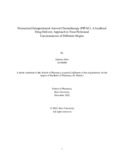Pressurized Intraperitoneal Aerosol Chemotherapy (PIPAC): A localized drug delivery approach to treat peritoneal carcinomatosis of different origins
Abstract
Pressurized Intraperitoneal Aerosol Chemotherapy or PIPAC has recently gained focus of
researchers worldwide in the field of oncology for treating the notorious cancer peritoneal
carcinomatosis. The aim of this review was to present a scientific overview of PIPAC for treating
peritoneal carcinomatosis of different origins. The methodology of the research was based on
reviewing the available scientific literature from reliable online resources. High pressure and
aerosol dosage form are utilized in PIPAC to deliver chemotherapy intraperitoneally. Oxaliplatin
and a combination of cisplatin followed by doxorubicin are the most frequently administered drugs
in PIPAC. PIPAC exerts a high local activity with lower systemic effects. PIPAC has shown
substantial tumor regression and efficacy. Some major and frequent minor adverse effects have
been identified. Larger clinical trials are needed to clearly define the indications of PIPAC, assess
its long-term toxicity, and expand its clinical use in the treatment of peritoneal carcinomatosis.

